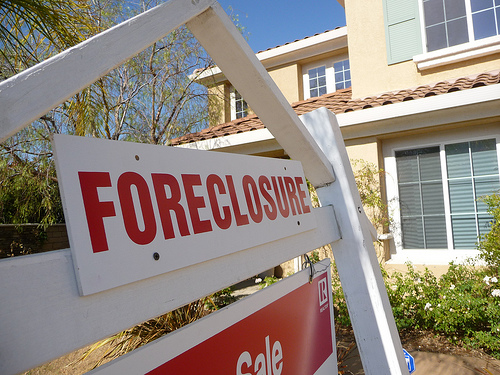Foreclosure Defense
If you have fallen behind on your mortgage payments and the bank is trying to take your home, Campbell Law can help you fight the foreclosure. Our law firm has developed aggressive legal strategies to ensure the bank follows all required legal procedures, to buy you and your family time to financially rebound, or to negotiate a more favorable agreement with the bank. Campbell Law may also seek a dismissal of the foreclosure proceeding based on improper documentation, improper securitization procedures, predatory lending, or other fraudulent lending practices.

The vast majority of homeowners are foreclosed on without exploring their legal rights, and in the process, lose valuable time and the chance to save their home. Don't let this happen to you or your family. If you are facing foreclosure, time is of the essence, so please contact us for a free consultation regarding your rights.
Important Tips
Some banks are foreclosing on properties they do not own, key documents are being forged by their agents, and frequently individuals
Below you will find several tips essential to persons forced to represent themselves in a Florida foreclosure. This information is in no way intended to serve as a substitute for competent legal representation. Instead, this information is intended to warn of a few obvious pitfalls that often befall individuals who proceed without an attorney.

Do Not Ignore the Foreclosure
Though confronting the idea of losing one’s home can be daunting, one of the worst mistakes one can make is to ignore the foreclosure. Failing to answer the foreclosure complaint within the prescribed time limit (usually 20 days) will lead to what is known as a default, effectively removing many constitutional due process rights, while simultaneously expediting the foreclosure process. Comply with every order of the court. If you fail to follow the direction of the court, you risk, at best, irritating the judge, and at worst, civil contempt and fees. In all matters relating to the foreclosure, pay close attention to the progression of the case.
Preserve a Paper Trail
A foreclosure is a form of civil lawsuit, and thus, preservation of evidence is essential to developing an effective defense. Make sure that all correspondence with the bank is in writing with some sort of confirmation that they received the communication (e.g., delivery or fax confirmation). Save and organize relevant past documentation and correspondence because you may need it.
Educate Yourself
First and foremost, read all documents carefully. The Florida foreclosure process, like many lawsuits, is very procedurally intensive. A foreclosure is a type of civil lawsuit, which is primarily governed by a set of guidelines known as the Florida Rules of Civil Procedure. An individual facing a civil court of this state should become very familiar with the Florida Rules of Civil Procedure (available at your local law library). Attempting to face a court of this state without knowledge of these procedures is very foolish and will likely end in disaster.
Do Not Give Up HOPE
Whether you are able to retain an attorney or not, do not give up hope. Remember to put your family first when considering how to proceed with your foreclosure. For more information regarding the foreclosure process, and to learn more, visit CampbellPA.com/foreclosure. Even if you do not think you can afford an attorney to represent you through the foreclosure process, please contact us, we may be able to help.
Overview of the Foreclosure Process
Florida is a judicial foreclosure state, meaning that when a lender, home owners association (HOA), or any other authorized party decides to foreclose on a property, they must petition a Florida court to oversee and approve the process. Chapter 702 of the Florida Statutes codifies the process to be followed by the courts and the parties to the foreclosure action. This means that you, the homeowner, have a right to be heard by a judge, and to retain legal counsel to assist you in defending against any foreclosure proceeding which has been brought against you. Due to the continually changing legal, economic, and political environment, it is difficult to predict exactly how long it will take for a typical foreclosure to be processed, but most take at least six months for the court to process.
Initiation of Foreclosure
The Florida foreclosure process, whether you live in Kissimmee, Celebration, Hunters Creek, Harmony, or some other part of Central Florida, begins with the bank sending the homeowner notification of default, informing them that they are behind on their payments. If the bank and the homeowner are unable to negotiate a resolution regarding the past due balance, the bank will eventually file a civil complaint, generally with the local circuit court, along with a Lis Pendens. The complaint will detail the grounds for the foreclosure and the lender's request for remedy and sale of the property. The Lis Pendens, Latin for pending lawsuit, is a notice to all potential buyers that the property is subject to a pending lawsuit. The complaint must be served upon you, the homeowner, and upon any other party who has an interest in the outcome of the case.
The Answer
After the homeowner receives a copy of the foreclosure complaint, the homeowner will have twenty (20) days to file a written response or answer to the allegations. If the bank is unable to find or serve the homeowner initially, the court will require, prior to allowing the foreclosure to progress, the bank to conduct what is normally termed a "diligent search" in an attempt to discover the current address of the homeowner so as to serve the complaint on the homeowner. The "diligent search" is basically a background check performed by a private investigator or process server. If the bank is unable to discovery where the homeowner lives, a notice will be placed in a local newspaper, after which, the homeowner will have thirty (30) days to respond to the allegations. It is very important that an answer be filed within the prescribed period (whether 20 or 30 days), because if you fail to do so, the court will accept all the allegations of the bank's complaint as true, and a default judgment will be entered against the homeowner. Once a default judgment has been filed, a foreclosure sale will be scheduled by the clerk of the court, and the home will likely be sold within approximately one month. The period for an answer is also the homeowner's opportunity to assert defenses and legal counterclaims against the bank based upon the facts of the case. If you are considering retaining an attorney to represent you through the foreclosure process, you should strongly consider doing so as soon as you learn that the bank will be filing the foreclosure complaint, as you may lose important opportunities to defend yourself if you delay.
The Right of Redemption
Under Florida Law, the mortgagor, the homeowner being foreclosed on, has the the right to redeem the loan thus ending the foreclosure proceeding. This means the homeowner can pay all outstanding debts to the bank or other lending institution and permanently prevent the property going to a foreclosure sale. Sadly this is rarely an option for most homeowners facing foreclosure. If you are facing foreclosure and redemption is not an option, contact us. One of the attorneys at Campbell Law would be happy to provide you a free consultation to help you weigh your options.
Creditor's Motion for Summary Judgment
Once the debtor has answered the original complaint, the creditor will likely next file a motion for summary judgment, along with any necessary supporting affidavits, on all of the claims they presented in their complaint. This request to the court basically asks the judge to grant each of the bank's requests, which would include selling the house at a foreclosure sale. This is the point at which the homeowner's original efforts to answer the complaint become very important. If the homeowner fails to sufficiently deny the allegations in the complaint and fails to raise counterclaims or affirmative defenses, the court will likely grant the motion for summary judgment if no material issues of fact remain to be determined. However, the court will allow the debtor a chance to appear at a hearing on the motion for summary judgment, and present any defenses in opposition to the motion. This hearing will generally occur at least three months from the date of the filing of the complaint.
Foreclosure Sale
Assuming the bank, home owners association (HOA), or other lender is able to obtain a judgment against the homeowner, the clerk of the court will schedule the property for sale at a foreclosure auction. Generally, the sale will be scheduled at least thirty (30) days from the date of the judgment. The foreclosure sale is generally held at your local court house, and will be conducted as a public auction subject to certain rules and procedures. Once the property is sold at the public auction, the homeowner, or any other interested party, will have ten (10) days to object to the sale. If no objections to the sale are filed within ten (10) days of the clerk certifying the sale, the clerk will file a certificate of title and serve a copy of it on each party which officially transfers title from the original homeowner to the winner of the foreclosure auction. Section 45.031 of the Florida Statutes governs the procedure of the foreclosure sale.
Deficiency Judgment
If the property sells for less than the value of the remaining balance of the debt at the foreclosure auction, the lender has the right to petition for what is known as a deficiency judgment. This means the bank will have the right to obtain the difference between the value of the sale price of the property and the balance of the debt. Though the bank may not be able to recover any money immediately from the debtor due to their financial situation, the bank may attempt to recover this deficiency at some future time from the debtor once they have accumulated sufficient assets.
